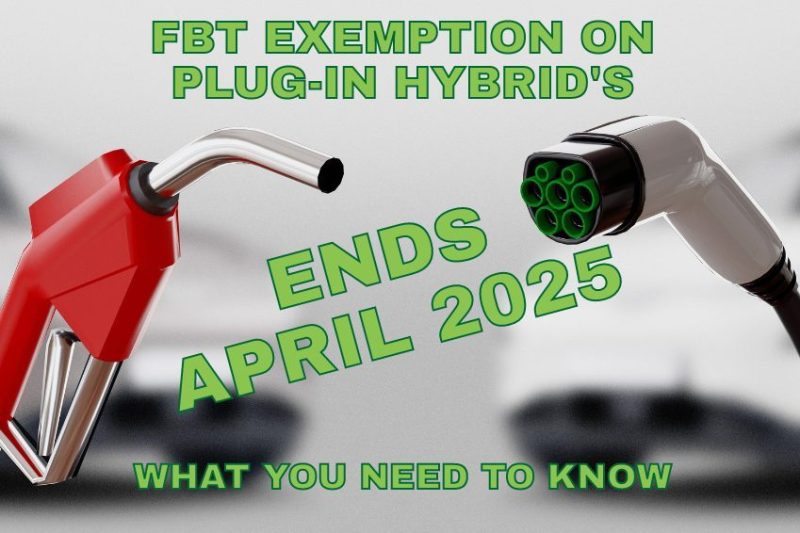The Fringe Benefits Tax (FBT) exemption for novated leases on plug-in hybrid electric vehicles (PHEVs) is set to end in April 2025, marking a significant change for Australians who may be considering this cost-effective, environmentally conscious vehicle option. With the right timing, however, Australians can still take advantage of this tax benefit before it’s phased out. Here’s a closer look at the implications of the end of this exemption, including insights from the 2022 Electric Vehicle Discount Bill, which set the stage for these incentives, and why acting sooner rather than later could be crucial.
The Background: 2022 Electric Vehicle Discount Bill
In 2022, the Australian government introduced the Electric Vehicle Discount Bill to incentivize the use of electric vehicles (EVs) by providing tax relief on eligible novated leases. This bill sought to support Australia’s net-zero emissions target by making EVs more affordable and accessible. A key feature of the legislation was the Fringe Benefit Tax (FBT) exemption for EVs, including battery electric vehicles (BEVs), hydrogen fuel cell electric vehicles, and plug-in hybrid electric vehicles (PHEVs) with a retail price below the luxury car tax threshold for fuel-efficient vehicles.
The FBT exemption effectively reduced the cost of these vehicles for employees by removing the tax obligation that would normally apply to employer-provided vehicles. This exemption has allowed many Australians to consider transitioning to electric and plug-in hybrid models, providing financial relief while encouraging environmentally friendly choices.

What’s Changing in April 2025?
As part of the 2022 Electric Vehicle Discount Bill, the FBT exemption for PHEVs was given a finite window of eligibility, set to conclude in April 2025. This means that any new PHEV novated leases entered into after this deadline will no longer qualify for the FBT exemption, though BEVs and hydrogen fuel cell vehicles will continue to be exempt.
Why Act Now: Long Vehicle Lead Times
The Australian car market, particularly for PHEVs and other EVs, has faced significant supply chain challenges and longer-than-average lead times in recent years. Ordering a PHEV, especially with the end of the FBT exemption looming, could mean waiting several months, if not longer, for delivery due to high demand and manufacturing delays. As a result, those who intend to take advantage of the FBT exemption on a PHEV should consider placing an order as soon as possible to ensure delivery before the April 2025 deadline.
Given the increased demand for plug-in hybrids and other EVs, waiting until 2024 to place an order could lead to missed opportunities to secure delivery in time to qualify for the tax exemption. Furthermore, as the April 2025 deadline approaches, demand may spike, leading to potential further delays.
Benefits of Acting Early
- Secure FBT Exemption: By ordering a PHEV in advance, you can lock in your eligibility for the FBT exemption before the April 2025 cutoff, lowering the overall cost of vehicle ownership.
- Increase Availability Options: Acting now increases the chance of finding your preferred PHEV model and configuration, which may become limited as demand rises closer to the deadline.
- Avoid Price Increases: Manufacturers may adjust prices as demand surges ahead of the April 2025 deadline, so acting early could save money.
Things to Consider When Thinking About Taking Advantage of the FBT Exemption on a PHEV
Under the current regulations, the Fringe Benefits Tax (FBT) exemption for plug-in hybrid electric vehicles (PHEVs) leased through a novated lease arrangement applies only if the vehicle remains within the scope of the novation agreement and the employee's employment status is consistent throughout the lease term. However, if the novated lease is discontinued (i.e., "de-novated") or if the employee changes jobs, the FBT exemption no longer applies. This change in circumstances triggers FBT liability, meaning that the lease will now attract FBT as the vehicle is no longer deemed an exempt benefit.
Employees considering a novated lease on a PHEV should be aware of the potential for FBT exposure if their employment situation or lease structure changes during the lease period, if you switch employers during your lease term, you would lose this tax advantage. As a result, you may face a higher taxable income, leading to a reduction in take-home pay due to additional tax obligations
For further information please refer to the link below to ATO website

